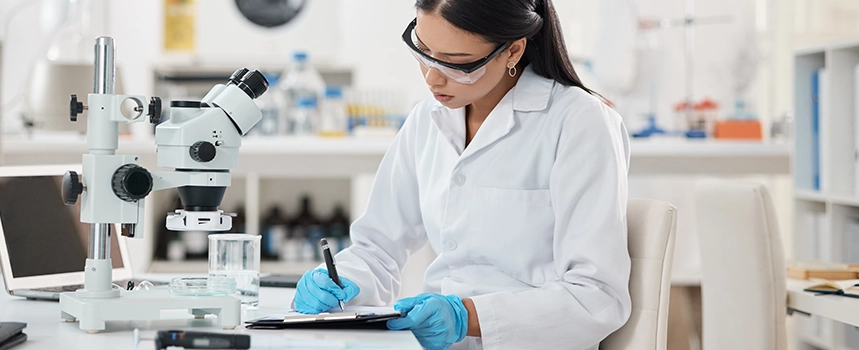Are you fascinated by science, love working with your hands, and dream of making a real difference in people’s lives? Then a career in clinical embryology might be perfect for you! Clinical embryologists are the heroes behind IVF and other assisted reproductive technologies (ART), working closely with eggs, sperm, and embryos to help couples realize their dream of parenthood.
With fertility centers expanding, the demand for professionals who can perform delicate procedures with accuracy is increasing. In this field, real success comes from developing hands-on lab skills, not just learning theory.
In this blog, we’ll guide you through the must-have lab skills every aspiring embryologist needs to succeed.
Understanding the Role of a Clinical Embryologist
Clinical embryologists are the scientists working behind the scenes in fertility treatments. They handle eggs and sperm, perform procedures like IVF and ICSI, culture embryos, and even freeze them for future use. Accuracy is very important, because every tiny step can affect success.
Being ethical and earning patient trust is essential, as your expertise and careful handling directly affect their journey. That’s why hands-on lab expertise is non-negotiable. For students, developing these practical skills early helps build confidence and prepares you for real-world fertility labs.
Lab Skills Every Aspiring Clinical Embryologist Must Master
Aseptic Techniques & Lab Safety
A clean lab is the first step to success! Aspiring embryologists must learn how to prevent contamination while working with eggs, sperm, and embryos. This means following strict biosafety protocols, wearing the right protective gear, and handling all samples carefully. Practicing these habits early helps students build confidence and verifies every procedure stays safe and successful. Keep in mind, even a tiny error in aseptic technique can affect the entire procedure’s success.
Microscopy Proficiency
Microscopes are essential tools in embryology. Students need to get comfortable identifying eggs, sperm, and grading embryos. Learning to use inverted and phase-contrast microscopes helps you develop precision and focus. The more hands-on practice you get, the better your hand-eye coordination becomes an essential skill when working with tiny cells under the lens.
Gamete Handling & Sperm Preparation
Handling gametes is delicate but exciting work! Students gain hands-on experience with sperm washing, density gradient centrifugation, and getting sperm ready for IUI or IVF procedure. They gain experience in safely and precisely managing oocyte retrieval for successful lab outcomes. Early exposure in a supervised lab teaches accuracy and steadiness, building the confidence needed for real clinical scenarios.
Embryo Culture Techniques
Lab-grown embryos need careful attention and the right conditions, much like taking care of young plants. Students learn to prepare and maintain culture media while monitoring pH, CO₂/O₂ levels, and temperature for optimal growth. Paying attention to these details assures embryos develop healthily. Hands-on practice allows students to understand what “healthy embryo growth” looks like and how small adjustments can make a big difference.
Cryopreservation & Thawing
Freezing and thawing embryos or eggs is an essential skill in ART. Students learn vitrification techniques, how to safely handle liquid nitrogen, and methods for successful thawing. Practicing under supervision helps students understand how timing and technique impact embryo survival, and builds confidence in handling these sensitive procedures safely.
Micromanipulation Techniques: ICSI & Laser-Assisted Methods
Micromanipulation requires patience and precision. Students practice intracytoplasmic sperm injection (ICSI) and laser-assisted hatching, as well as biopsy for genetic testing. These techniques demand steady hands and concentration. Learning them during training gives students the confidence to perform these delicate procedures in real IVF labs, turning theory into practical skills.
Record-Keeping, Quality Control & Documentation
Good embryologists are organized too! Students must learn to maintain accurate lab records for traceability, follow quality control measures, and understand lab accreditation standards. Proper documentation guarantees patient safety, ethical practice, and reproducibility. Developing these habits early prepares students for professional lab environments where every detail matters.
Soft Skills Complementing Lab Expertise
While mastering lab techniques is essential, soft skills are just as important for aspiring embryologists. These skills help you work efficiently, communicate clearly, and handle delicate procedures with confidence. They also make sure you maintain ethical standards and provide empathetic care to patients. Developing these abilities early sets you up for a successful and rewarding career in reproductive medicine.
Key Soft Skills for Students:
- Attention to detail and steady hand-eye coordination
- Patience and problem-solving in challenging situations
- Clear communication with doctors and lab teams
- Ethical responsibility and empathy toward patients
How to Build and Sharpen These Skills
Practical experience and continuous learning help students become confident embryologists.
Tips for Students:
- Enroll in accredited programs – Choose recognized embryology or ART training programs that provide structured and comprehensive learning.
- Attend hands – on workshops and internships- Gain real lab experience and practice delicate procedures under supervision.
- Practice regularly in simulation labs – Build confidence and refine your techniques before handling real clinical procedures.
- Stay updated on new ART technologies – Learn about the latest advancements in IVF, ICSI, embryo culture, and cryopreservation.
- Seek mentorship and guidance – Guidance from skilled embryologists helps improve techniques and build confidence in laboratory work.
Conclusion
Mastering essential lab skills like aseptic techniques, microscopy, gamete handling, and embryo culture is key for any aspiring embryologist. These skills not only open doors to exciting career opportunities but also directly impact the success of fertility treatments.
For students, investing time in hands-on practice, workshops, and continuous learning builds confidence and prepares you for a rewarding career in reproductive medicine. Staying curious, practicing consistently, and developing soft skills like patience, attention to detail, and communication further guarantee success in this highly specialized field.






